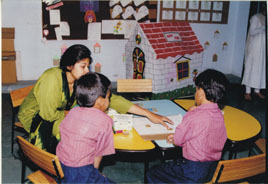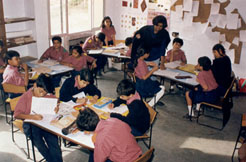The student-educator interaction must transcend formal transactions between two roles, and become a relationship between two roles, and become a relationship between two human beings. Thus, whether it is a child being praised or punished, whether it is an assignment being given or an assessment being made, the uniqueness of the situation must lead to a case-to-case approach rather than offering standard remedies for "standard" situations. Eklavya School believes that providing individual attention to each child, rather than offering a "mass production solution" is a cornerstone of quality education.

Class Sizes

Smaller the class, the greater the attention given to the child during learning, evaluation and feedback. The educator can also spend more time per student, and access to common resources like computers, library facilities, etc. is higher. Class sizes in Eklavya School are restricted as shown below.
| Class | Max. Student |
| Nursery | 20 |
| Jr.kg | 20 |
| Sr.kg | 20 |
| 1- 12 | 25 |
Home Visits
Educators of the school conduct home visits once a year to understand the child in her environment, thus building better rapport between the school, child and parent. This informal interaction puts the child at ease and enables the educator to relate with the child better.
Individual Parent Educator Meeting (IPEM)
Gandhiji, Vinobha Bhave and many other great educationists have said that for a child to blossom both educators and parents should work together. Individual Parent educator meeting is one such platform wherein a comprehensive plan of action is worked out to make the learning process much more effective and enriching. A clear half an hour is allocated per child wherein both the parents and the educator work together towards achieving a common goal.
Mother’s workshop
Mother’s workshops are yet another platform for effective parent-educator partnership. Once in a fortnight an hour’s workshop is held for every class separtely . Here the educators share with the mothers the concepts and methodologies to be covered in the next fifteen days. This helps the school and the parent to work in tandem. In addition to academics, areas like child development, handling emotions, nutrition etc are also explored along with professionals in the field.
Remedials
Tuitions are an evil of society that must be eradicated, since they gear the student to crack exams, and not necessarily to learn anything significant. However, even with small class sizes, at times, students need additional help in language and math. A remedial programme is run in the school for children who need extra attention in these areas. In this programme, students learn in even smaller groups at their own pace and level during the time allotted.
Counseling
Each educator in Eklavya sees herself as a counselor too. However, trained counselors are available for children who need psychological and emotional counseling, and to equip students with the requisite Skills for Adolescence.
"Umang" Story Telling
From olden times it is believed that teachers pass on values and ideals to their students by telling them stories. Stories not only have an entertainment value but all stories carry some important underlying message about life.
To revive this method of value education through story telling, 8-10 "grandparents" from Umang (an old persons welfare organization) come and tell stories to our pre-schoolers. This session with "Dadaji & Dadiji" is eagerly looked forward to every month by our tiny tots.